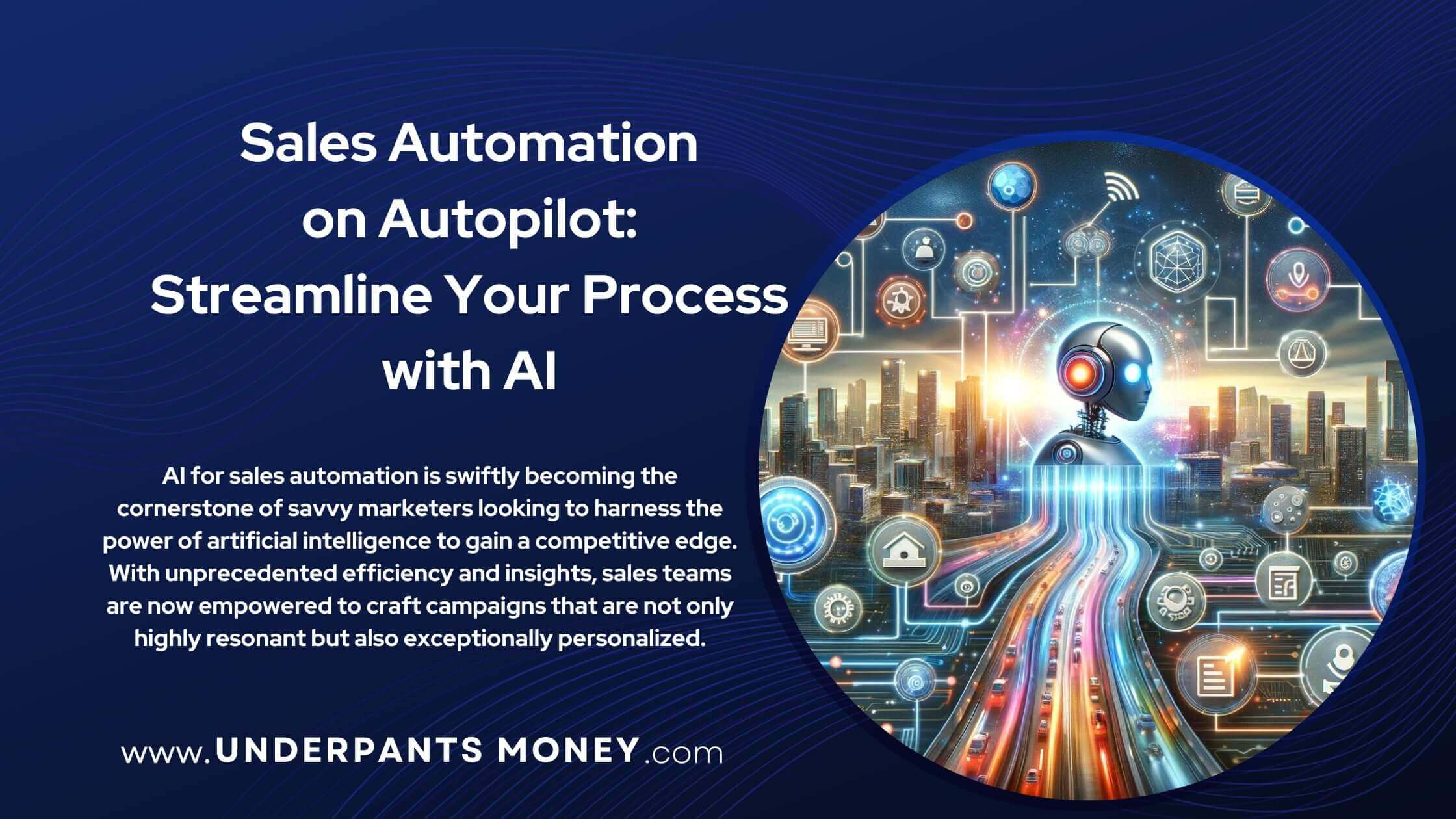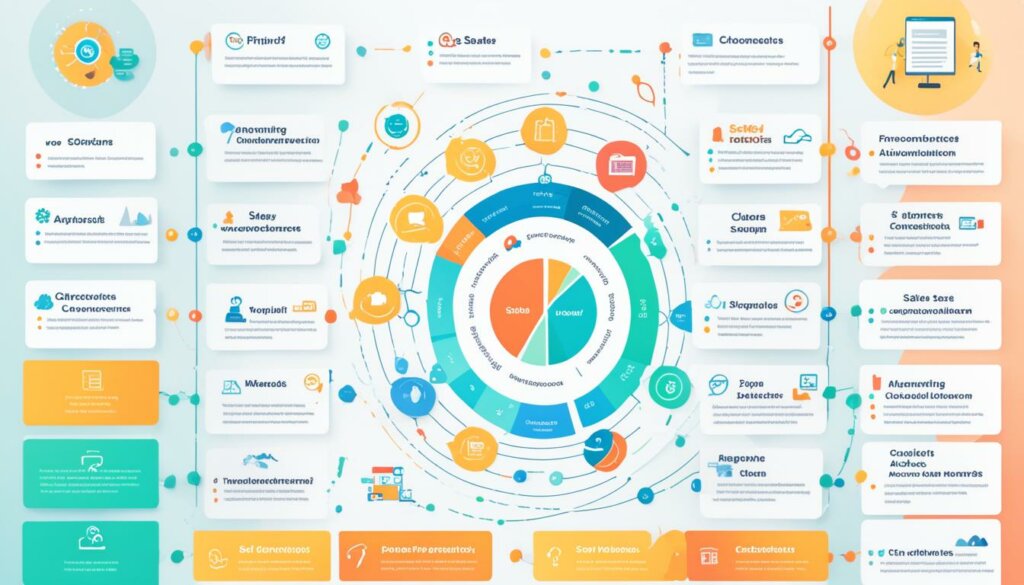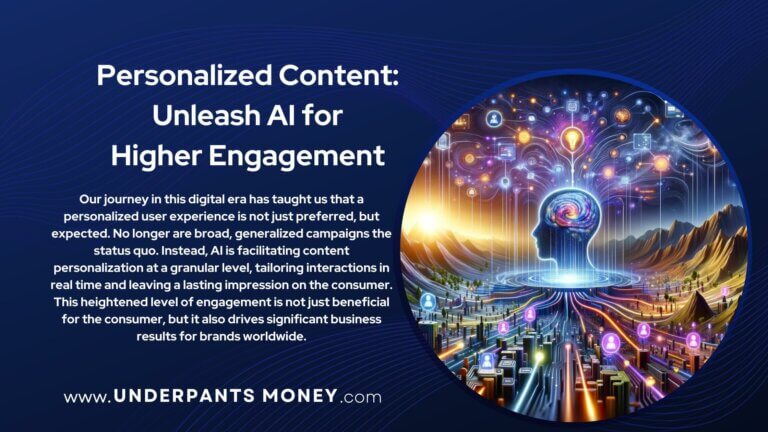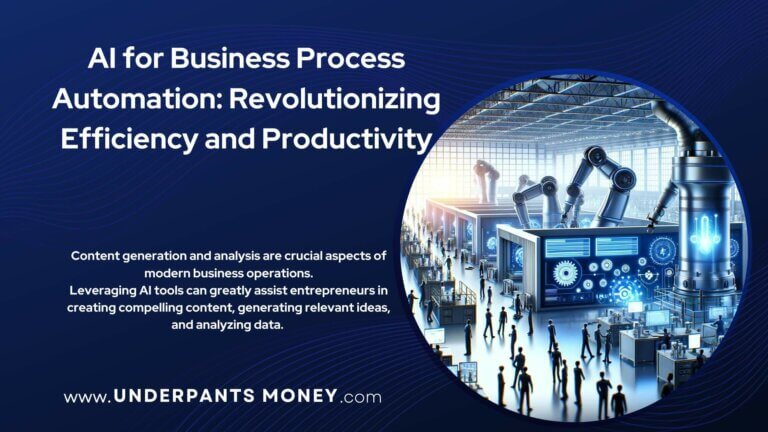Sales Automation on Autopilot: Streamline Your Process with AI

Imagine if 30% of sales-related activities could be automated with the current technology. This startling figure from McKinsey & Company taps into the enormous potential of sales automation AI, transforming the digital sales solutions landscape. Today, we’re on the brink of an AI revolution that’s redefining the essence of effective sales strategies. AI for sales automation is swiftly becoming the cornerstone of savvy marketers looking to harness the power of artificial intelligence to gain a competitive edge. With unprecedented efficiency and insights, sales teams are now empowered to craft campaigns that are not only highly resonant but also exceptionally personalized.
Through the adoption of pioneering AI platforms such as Google Analytics, HubSpot, and Adobe Analytics, real-time data on customer behavior is no longer a luxury—it’s a staple. This granular-level analysis enables us to tailor interactions with precision previously unattainable. Integrating AI tools like Marketo, Salesforce Marketing Cloud, and Oracle Eloqua automates repetitive tasks, paving the way for creativity and strategic thinking. The dawn of chatbots and smart customer service solutions like Zendesk and Intercom is revolutionizing the customer support domain, ensuring immediate attention to queries. The decision-making process is further enriched with robust AI applications like Tableau, Looker, and Domo, through which we distill rich insights from data, catalyzing the growth and innovation of businesses.

Key Takeaways
- AI for sales automation offers an opportunity to automate up to 30% of sales tasks.
- Advanced tools like Google Analytics and HubSpot provide critical real-time customer data for targeted campaigns.
- The integration of AI enhances the personalization and efficiency of communication and sales strategies.
- AI tools automate mundane tasks, allowing sales and marketing teams to focus on high-value activities.
- Chatbots and AI customer service tools improve response times and customer satisfaction.
- Data-driven decision-making is fortified by AI analytics platforms, driving business growth and innovation.
Embracing AI for Sales Automation
As we delve into the realm of sales automation, it’s evident that the integration of sales AI technology is revolutionizing the way we manage sales processes. By incorporating machine learning for sales, repetitive tasks that traditionally bogged down sales teams are now being handled efficiently, allowing for a strategic shift towards more critical functions like lead nurturing and customer engagement.
The impact of automated sales processes on productivity is undeniable. These advanced systems enhance the speed and accuracy of tasks like data entry and lead qualification, freeing sales professionals to focus on tailor-made customer interactions and closing deals.
| Without AI | With AI |
|---|---|
| Manual data handling | Automated data capture and analysis |
| Guesswork in lead prioritization | Data-driven lead scoring |
| Generic customer communication | Personalized customer engagement |
| High costs due to inefficiencies | Cost reduction through process optimization |
| Extended sales cycles | Shortened sales cycles with predictive analysis |
Moreover, AI’s capability to learn and adapt ensures that our automated sales processes are not static; they constantly evolve based on customer feedback and interaction patterns. This dynamic aspect of sales AI technology is imperative for businesses looking to maintain a competitive edge in today’s fast-paced marketplace.
- Utilization of AI for personalized product recommendations
- Enhanced forecast accuracy with machine learning algorithms
- Assistance in crafting compelling sales strategies using AI insights
By embracing machine learning for sales, we are positioning ourselves to meet and exceed our sales targets while providing an unmatched customer experience that fosters long-term loyalty.
Benefits of Integrating AI into Your Sales Strategy
As we delve deeper into the innovative world of artificial intelligence, we find that infusing AI into sales processes is becoming increasingly pivotal for businesses aiming to stay ahead of the curve. The result is a sales strategy that not only drives efficiency but also enhances customer satisfaction through personalization and real-time insights.
Real-Time Data Analysis and Customer Insights
In the era of data-driven decisions, AI shines by offering real-time data analysis and customer insights. These insights are essential for optimizing sales with AI, as they enable us to understand our clients like never before, tailoring our approach to meet their specific needs and preferences effectively.
Enhanced Personalization for Customer Interactions
When it comes to automated lead generation, AI stands unrivaled. The sophistication of AI allows us to craft customer interactions meticulously, in ways that resonate on a personal level. This establishes a trust that is crucial for long-term customer loyalty and is integral to effective sales optimization.
Increase in Efficiency and Time-Saving
AI’s ability to execute a multitude of tasks invariably leads to an increase in efficiency for sales teams. It translates into significant time savings, liberating sales professionals from mundane tasks and freeing them to focus on strategic initiatives that drive sales and growth.
| Feature | Benefits | Impact on Sales |
|---|---|---|
| AI Data Analysis | Deep customer insights, real-time data access | More informed strategies and personalized marketing |
| Automated Lead Generation | Efficient prospecting, higher quality leads | Increased conversion rates, improved ROI |
| Personalization at Scale | Customized customer interactions, enhanced engagement | Higher customer retention, greater brand loyalty |
| Time-Efficiency | Freedom from repetitive tasks, more focus on strategy | Sales growth, competitive advantage |
Furthermore, in this technological renaissance, those who adapt swiftly and strategically to sales optimization through AI are bound to gain a competitive advantage. The benefits gained from integrating AI into sales strategies are not just transformational but are also essential for maintaining relevance in a rapidly evolving market landscape.

Tools for Automation: From Customer Contacts to Closing
As leaders in the realm of sales automation, we understand the profound impact that digital sales solutions and artificial intelligence can have on the sales process. It’s not just about implementing technology; it’s about embracing sales AI technology that transforms how we approach our business strategies, from the first customer contact all the way to the final closing handshake.
Automating Lead Generation and Prospecting with AI
AI has gifted us the ability to revolutionize lead generation and prospecting. By harnessing powerful algorithms, we can now source and nurture leads with little to no manual intervention. This not only increases our efficiency but also guarantees a consistent flow of qualified potential customers, leading to better conversion rates.
AI-Powered CRM Systems to Revolutionize Follow-ups
Our CRM systems are no longer mere databases; they’re intelligent ecosystems powered by AI. These systems enable us to create more meaningful interactions with our clientele by remembering their preferences, purchase history, and even predicting their future needs. This high level of personalization in our follow-ups ensures that customer relations are not just maintained but fortified.
Streamlining Workflow with AI-Enabled Analytics Tools
The integration of AI-enabled analytics tools has streamlined our workflow to a point of unmatched efficiency. By interpreting complex data, these tools provide actionable insights that allow our team to make informed decisions swiftly, always staying one step ahead of the competition.
| AI Tool Category | Key Functionalities | Examples |
|---|---|---|
| Lead Generation | Prospect Identification, Data Capture, Lead Scoring | HubSpot, Marketo, Salesforce Pardot |
| CRM Systems | Contact Management, Sales Forecasting, Customer Engagement | Salesforce CRM, Zoho CRM, Microsoft Dynamics 365 |
| Analytics Tools | Data Visualization, Trend Analysis, Predictive Analytics | Google Analytics, IBM Watson Analytics, Tableau |
In our journey to redefine sales through advanced digital solutions, we’ve only just begun to tap into the potential of artificial intelligence. It’s a transformative era for sales professionals everywhere—a time of prolific growth, learning, and boundless possibilities borne from the technological marvels at our fingertips.

Overcoming Challenges in Sales Automation with AI
As we navigate the integration of AI into automated sales processes, we’re keenly aware of the fine line that exists between enhancing efficiency and retaining the indispensable human touch. The incorporation of AI for sales automation holds promise for optimizing sales with AI, yet it is accompanied by an array of complex challenges that require a nuanced strategy for successful implementation.

One primary concern is over-automation, which threatens the personal connections crucial to building long-term customer relationships. Conversely, under-automation could result in wasted opportunities as sales teams are bogged down by mundane tasks. Our approach thoughtfully performs a balancing act, using AI to manage repetitive responsibilities while ensuring the subtleties of human interaction are not overlooked.
| Challenges in Sales Automation | AI Implementation Strategies | Expected Outcomes |
|---|---|---|
| Finding the right automation balance | Carefully select processes for automation while maintaining manual touchpoints | Streamlined operations that conserve personal interactions |
| Integration into existing sales strategies | Crafting seamless AI tool adoption plans | Enhanced workflow continuity and team adoption rates |
| Data and content quality control | Implementing robust data accuracy checks and balances | Reliable, trustworthy data driving customer relationships |
As we diligently work to overcome these obstacles, we place a high emphasis on the agility and adaptability of our sales strategies. Our focus on precision in selecting AI tools aids in maintaining the integrity of data and fostering an environment of trust with our clients.
To sum it up, our journey in optimizing sales with AI is a testament to our commitment to progress, innovation, and a customer-centric approach that harmonizes cutting-edge technology with the irreplaceable value of human connection.
Sales Automation AI: Optimizing the Sales Journey
As we delve deeper into a technologically driven marketplace, our approach toward sales automation must evolve. In this new era, we’re not just automating for efficiency; we’re optimizing the entire sales journey with sophisticated AI tools. Hand-picking the right sales automation AI is a critical step in enhancing our sales processes and outcomes. It’s about enabling our teams to work smarter, not harder, through the strategic application of machine learning for sales. The ultimate goal here is sales optimization, ensuring each touchpoint with potential leads is precisely calibrated for success.
Choosing the Right AI Technology for Different Sales Stages
The journey from potential lead to loyal customer involves numerous, distinct stages, and each one requires specific AI-powered interventions. Our selection process weighs the needs of every stage, from the data-driven precision required in lead acquisition to the nuanced interactions of customer relationship management. By adopting the right sales automation AI technology, we position ourselves to anticipate market trends, adjust our strategies with agility, and carve out a competitive edge. To us, this isn’t just about embracing change—it’s about leading it.
Customizing AI Tools to Fit Unique Business Needs
Understanding that each business has its own set of unique challenges and goals, we tailor our AI tools with great care. Customization is key to unlocking the full potential of machine learning for sales, aligning every automated solution with our larger business strategy. This customized approach ensures that we do not merely adopt new technologies; we adapt them, making them truly ours. It’s an ongoing process of refinement that keeps our sales performance at its peak, fostering growth in an ever-changing landscape. With each smart integration, we step closer to realizing the full spectrum of benefits that sales automation AI brings to the table.
FAQ
What exactly is sales automation AI?
Sales automation AI refers to the application of artificial intelligence technology to streamline and optimize the various tasks and processes involved in sales. This includes automating data entry, lead prioritization, email marketing, and more. By using AI-driven tools, businesses can increase efficiency and give their sales teams more time to focus on closing deals and building customer relationships.
How can AI for sales automation improve our digital sales solutions?
AI for sales automation can enhance digital sales solutions by analyzing customer data to provide personalized experiences, predicting customer needs, and presenting optimized sales strategies. AI tools can also automate repetitive tasks such as data entry and lead scoring, which allows for more efficient use of resources and faster response times to potential buyers’ interests and inquiries.
What are the key benefits of integrating AI into our sales strategy?
Key benefits include real-time data analysis providing deep customer insights, enhanced personalization of customer interactions leading to improved satisfaction, and significant increases in efficiency and time-saving by automating manual tasks. This leads to a more strategically focused sales team and better sales outcomes.
Which AI-powered CRM systems are best for optimizing follow-ups with customers?
Several AI-powered CRM systems stand out for optimizing follow-ups, including Salesforce, HubSpot, and Zoho CRM. These platforms use machine learning algorithms to track customer engagement, suggest optimal follow-up times, and facilitate personalized communication, thus streamlining the follow-up process and making it more effective.
Can sales automation AI help with lead generation?
Absolutely. Sales automation AI excels at automating lead generation and prospecting by identifying potential customers based on their online behavior and engagement. It can also score and qualify leads, so that sales teams can focus their efforts on the most promising prospects.
What are common challenges when incorporating AI into automated sales processes?
One of the main challenges of incorporating AI into automated sales processes is finding the right balance between automation and the human touch. Companies must also ensure the integration of AI tools aligns with their existing sales processes and systems. Additionally, data quality and privacy concerns are critical and require careful management to maintain customer trust and comply with regulations.
How can we choose the right AI technology for different stages of the sales process?
When choosing the right AI technology for different sales stages, it’s essential to assess your specific needs and challenges at each stage, be it lead generation, nurturing, closing, or customer retention. Look for AI tools that offer capabilities closely aligned with your goals, such as predictive analytics for forecasting or natural language processing for customer interactions.
In what ways can we customize AI tools to fit our unique business needs?
Customizing AI tools can involve training machine learning algorithms with your own data to reflect your unique sales patterns and customer behaviors. It may also include configuring AI-powered applications to integrate seamlessly with your existing tech stack and sales workflows, enabling personalized touch points that resonate with your target audience.






